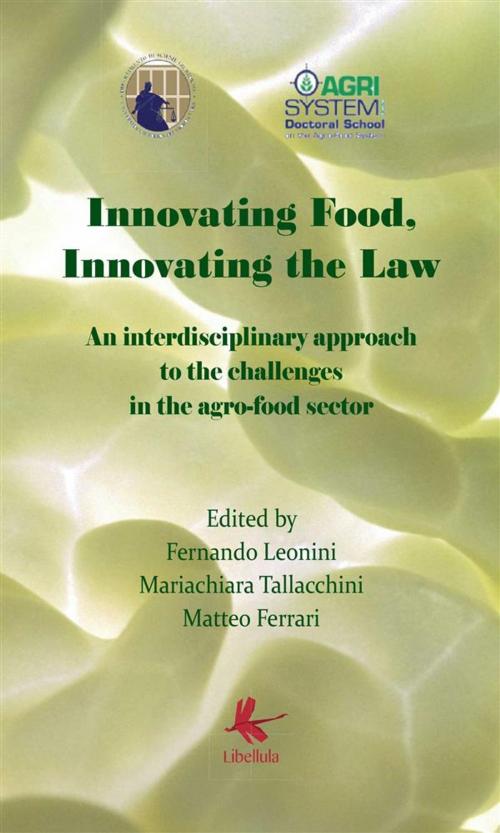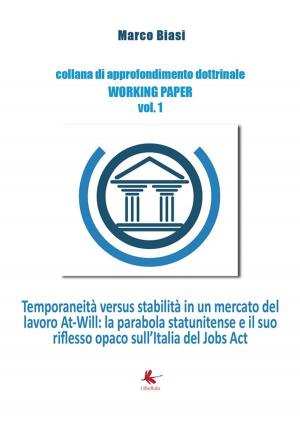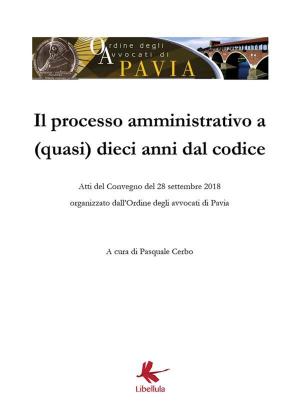| Author: | Mariachiara Tallacchini, Fernando Leonini, Matteo Ferrari | ISBN: | 9788867351961 |
| Publisher: | Libellula Edizioni | Publication: | July 2, 2014 |
| Imprint: | Language: | Italian |
| Author: | Mariachiara Tallacchini, Fernando Leonini, Matteo Ferrari |
| ISBN: | 9788867351961 |
| Publisher: | Libellula Edizioni |
| Publication: | July 2, 2014 |
| Imprint: | |
| Language: | Italian |
Innovating Food, Innovating the Law. An interdisciplinary approach to the challenges in the agro-food sector
Edited by Fernando Leonini, Mariachiara Tallacchini, Matteo Ferrari
The agro-food sector represents a strategic domain for innovation both in the technoscientific and legal field. In fact, if agriculture, food production and distribution are rooted in the history of humankind, they have been radically reshaped jointly by techno-science, policy, and the law. This volume provides an overview of four major areas of interest.
The first one deals with the impact of information and access to knowledge on new rights in the agro-food sector; the second focuses on the role of culture and value systems related to food and food habits; the third area concerns the legal requirements for safety in a globalized world; the fourth aims to explore new regulatory approaches to promoting and rewarding innovation in the agro-food sector.
Innovating Food, Innovating the Law. An interdisciplinary approach to the challenges in the agro-food sector
A cura di Fernando Leonini, Mariachiara Tallacchini, Matteo Ferrari
Il settore agroalimentare rappresenta un ambito strategico per l’innovazione scientifica e giuridica. Infatti, se agricoltura, produzione e distribuzione alimentare si radicano nella storia dell’umanità, esse sono state radicalmente ridefinite dall’azione congiunta di tecnoscienza, policy e diritto. Il volume esplora quattro aree legate al cibo, all'interfaccia tra innovazione tecnoscientifica e giuridica. La prima guarda all’impatto prodotto dall’accesso
all’informazione sull’emergere di nuovi diritti in campo alimentare; la seconda approfondisce le relazioni tra valori, pluralismo culturale e abitudini alimentari; la terza area considera i criteri di sicurezza alimentare in un mondo globalizzato; la quarta indaga i nuovi approcci normativi alla promozione e valorizzazione dell'innovazione agroalimentare, in particolare per quanto riguarda l’uso dei brevetti.
Innovating Food, Innovating the Law. An interdisciplinary approach to the challenges in the agro-food sector
Edited by Fernando Leonini, Mariachiara Tallacchini, Matteo Ferrari
The agro-food sector represents a strategic domain for innovation both in the technoscientific and legal field. In fact, if agriculture, food production and distribution are rooted in the history of humankind, they have been radically reshaped jointly by techno-science, policy, and the law. This volume provides an overview of four major areas of interest.
The first one deals with the impact of information and access to knowledge on new rights in the agro-food sector; the second focuses on the role of culture and value systems related to food and food habits; the third area concerns the legal requirements for safety in a globalized world; the fourth aims to explore new regulatory approaches to promoting and rewarding innovation in the agro-food sector.
Innovating Food, Innovating the Law. An interdisciplinary approach to the challenges in the agro-food sector
A cura di Fernando Leonini, Mariachiara Tallacchini, Matteo Ferrari
Il settore agroalimentare rappresenta un ambito strategico per l’innovazione scientifica e giuridica. Infatti, se agricoltura, produzione e distribuzione alimentare si radicano nella storia dell’umanità, esse sono state radicalmente ridefinite dall’azione congiunta di tecnoscienza, policy e diritto. Il volume esplora quattro aree legate al cibo, all'interfaccia tra innovazione tecnoscientifica e giuridica. La prima guarda all’impatto prodotto dall’accesso
all’informazione sull’emergere di nuovi diritti in campo alimentare; la seconda approfondisce le relazioni tra valori, pluralismo culturale e abitudini alimentari; la terza area considera i criteri di sicurezza alimentare in un mondo globalizzato; la quarta indaga i nuovi approcci normativi alla promozione e valorizzazione dell'innovazione agroalimentare, in particolare per quanto riguarda l’uso dei brevetti.















